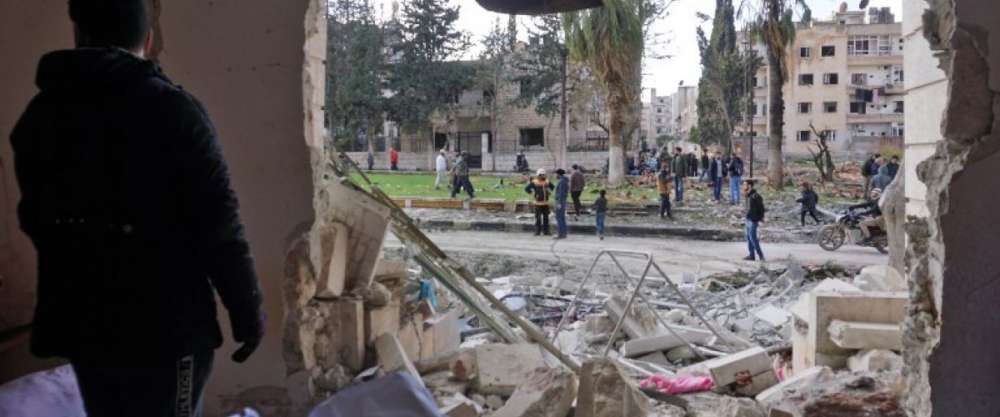Beirut: The Hayat Tahrir al-Sham alliance led by Syria’s former Al-Qaeda affiliate governs most aspects of public life in the northwestern anti-regime bastion of Idlib.
Raising income from key trade crossings, it rules over the affairs of three million people with a civilian government, a security apparatus, and religious courts.
Sometimes described as an “Al-Qaeda emirate”, the area has drawn comparisons with the now defunct “caliphate”, the proto-state once run by the IS group.
Here are some key aspects of the de facto statelet’s governance:
– Eight ministries –
Since 2015, Syria’s then Al-Qaeda affiliate and a myriad allied or rival factions have controlled different parts of the northwestern region of Idlib, forming local councils to control its towns and villages.
These councils were managed and received funding from the exiled political opposition’s so-called “Transitional Government” based in Turkey.
In 2017, Hayat Tahrir al-Sham — renamed after renouncing ties with Al-Qaeda and assimilating other armed factions — slowly started to fight rival groups.
The same year, the jihadist-led alliance founded the so-called “Salvation Government” to be its civilian branch.
HTS slowly succeeded in bringing all competing rebel groups under its authority, with the Salvation Government in early 2019 taking over the administration of the whole region.
“In the shadow of the Salvation Government, the role of local councils became weaker,” researcher Ayman al-Dassouky said.
“Some became affiliated to it while others were forced to work with it,” the researcher at the Turkey-based Omran Centre told AFP.
The Salvation Government includes eight ministries: interior, justice, religious endowments, health, education, local administration and services, economy, development, and social affairs.
HTS’ powerful security force deals with regional security.
It is assisted by the Salvation Government’s police force with lesser responsibilities such as managing traffic, catching criminals, and solving disputes.
Before the Salvation Government became more powerful, HTS had its own moral police, the Hisba, checking that women were dressed modestly and related to the men accompanying them.
They have become less prominent over the past months, local residents say.
The head of the Salvation Government is Fawaz Hilal, who assumed his post late last year, but the region’s strongman is HTS chief Abu Mohammed al-Jolani.
– University licences –
In 2015, universities in Idlib province were revived as private institutions, while an education authority affiliated to the political opposition was set up to monitor schools.
But this school year, the Salvation Government sought to bring them under its control by requesting they be reviewed for a new licence from its Council of Higher Education.
Earlier this year, it closed a dozen that did not immediately comply.
But students complain that the degrees issued by these institutions are not recognised beyond the province.
As they are allowed to travel out of Idlib to regime-held areas, they often resort to studying in government-held territory to obtain more widely accepted diplomas.
– Religious courts –
After all regime institutions disappeared from Idlib in 2015, the state’s tribunals were replaced by religious courts.
Most of the judges appointed were loyal to HTS, said Nawar Oliver, a fellow researcher at the Omran Centre.
After the January 2019 takeover of the Salvation Government, they were brought under the auspices of its justice ministry.
Judgements are often slow to be implemented, with the exception of speedy trials “against Islamic State group cells that are often death sentences”, Oliver said.
– Border crossings –
HTS has a grip on the region’s economy, controlling all trade crossings — both with Turkey and across the frontline into regime-held areas, though their number has declined due to a spike in violence since late April.
At the Al-Ais crossing to government-held areas, the only such one still open in Aleppo province, they levy taxes on those driving in and out of Idlib.
The Bab al-Hawa crossing with Turkey is a major source of income, through customs fees on all goods entering, including clothes, food, fuel and its derivatives.
The jihadist-led alliance even raises money from the banking sector, in some cases directly or indirectly owning money transfer or changing businesses.
According to Dassouky, HTS even has “influence over independent currency exchange shops, which are obliged to comply with its conditions to ensure they can continue operating, and pay it fees or royalties”.
HTS has ties with a wide network of traders, and has its hand in the fuel trade via the Watad Petroleum Company, which holds the monopoly on importing hydrocarbons from Turkey.
[source_without_link]Agence France-Presse[/source_without_link]

